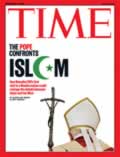 I wonder if the is the first Ad Orientum Time Cover?
I wonder if the is the first Ad Orientum Time Cover?
There cover story on the Pope and Islam as he gets ready to go to Turkey includes What the Pope Gets Right by Fr. Neuhaus and of course the Muslim balance of And Where He’s Still in the Dark. Rather ironic title considering that the author of it is the one in dark as far as the Regensburg speech goes.
But Benedict’s speech implicitly suggested that he believes that Islam has no such relationship with reason–and thus is excluded from being European.
He frames the Pope’s whole speech on being European centric and says that Benedict is a "profoundly European Pope." That he whole speech was about European identity. It is amazing how so many can read the same speech and then talk about as if they read a totally different one. He then goes on to what Kathy Shaidle would describe as "They invented Chess you know" defense of Islam with a list of influential Muslim scholars – though it seems to me most of them were greatly influenced by Greek thought in the first place. One he mentions kind of makes the Pope’s point about reason. Avicenna believed that human minds were not in themselves capable of abstract thought, only potentially and only when illuminated by an angel – the Tenth Intellect.

7 comments
As an avid chess player, I have to say that chess was probably invented in India (or China). And yeah, they’re best philosophical service was preserving texts of Aristotle, but Aquinas had to come along and tell them how to read ’em right. 🙂
Didn’t the Muslims invent Algebra?
Panda,
Actually it dates back to the Babylonians. The Hellenistic mathematician Diophantus has traditionally been known as “the father of algebra”, though a book by al-Khwarizmi is said to have defined the subject.
Though many forget that the word Alchemy comes from the Arab work al-kimiya when listing Arab accomplishments or in this case errors.
It is amazing how so many can read the same speech and then talk about as if they read a totally different one.
Or not read it and pretend to have done so.
To be fair, it is of course true that Muslim scholars in the middle ages were greatly influenced by Greek thought – but so were Christian scholars, especially after the introduction of the Aristotelian corpus into the West, from the Muslim world, in the 13th century. Given the immense heights of thought reached by the Greeks, it should hardly count against anyone to have been influenced by them.
Avicenna may have had a particular theory of human cognition as requiring illumination; but let’s remember that some of our great Christian saints (Augustine, Bonaventure) thought that it was impossible that we know any truths except by being “illuminated” by God. The works of Avicenna would greatly influence St. Thomas’ metaphysics, so I think we should be wary of dismissing them too lightly.
It is not a denial of Christian tradition to recognize the achievements of other civilizations. Such recognition has little to do with whether Islam is true; nor with whether Islam has a problem with violence and intolerance (which it obviously does).
Dave,
I wasn’t trying to deny the contributions made by others. Just the fact that people often bring up the Islamic philosophers as if their contributions were something new instead of being primarily built on Greek thought. And that many of the their ideas were not seen as being compatible within Islam in the first place. Often they could be classed more as Arabic philosophers than specifically Islamic ones.
Muslim Aristotelian philosophy did make some important contributions but by and large tended towards pantheism due to other influences such as Persian elements. Ultimately, Muslim philosophy could not be reconciled with Mohammed.
Here is a short work entitled REASONS FOR THE FAITH AGAINST MUSLIM OBJECTIONS which St Thomas composed not long after the SUMMA CONTRA GENTES.
http://www.diafrica.org/nigeriaop/kenny/Rationes.htm
Is the thought of the Medieval Muslim philosophers given any serious consideration by todays Muslims?
Anne Freemantle, in the book THE AGE OF BELIEF writes that Averroes was the last great Muslim Aristotelian to stand up against Muslim Orthodoxy.